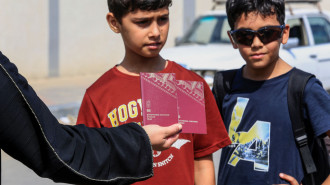'Hell falling': Palestinians in Rafah recount horror of Israeli strikes
Majed al-Afifi was just 40 days old when he was killed, his uncle told AFP in Rafah where Israeli forces bombed multiple homes.
"We heard the bombing without warning," said Said al-Hams, 26, in Rafah refugee camp.
His nephew, a twin, "was born exactly 40 days ago and was killed", while their mother was wounded.
The newborn is among around 100 people killed by Israeli forces overnight in Rafah, according to the health ministry in Gaza.
Dozens of Israeli strikes pounded Rafah, where some 1.4 million people have sought refuge since Israel began its military offensive on the besieged enclave on 7 October and ordered people to move south as it bombed northern and central Gaza.
While there was jubilation in Israel over the liberation of the two hostages on Monday, in Rafah people recounted a fearful night.
"The situation was hell," said Abu Suhaib, who was sleeping dozens of metres from where Israeli forces struck.
"We heard the sound of explosions, like hell falling down on civilians," he told AFP.
The 28-year-old said he heard warplanes firing, shooting and a helicopter landing.
A massive pile of rubble stands where multiple buildings were flattened by Israeli strikes, beside the remains of a four-storey house.
Witnesses said the residents of the house fled two months ago, after the Israeli military warned them it would be bombed.
The aerial bombardment also left five vast craters, at least 10 metres wide and five metres deep, an AFP journalist said.
"I can't tell you how we survived the night," said Abu Abdullah al-Qadi, who was woken by the sound of shooting.
"They killed my cousin, they killed a lot of people with strikes," he told AFP, as dozens gathered by the destroyed buildings.
"They stormed this building and it appears that they freed prisoners - and then they bombed it," said Qadi.
"They bombed all the houses next to it," he added.
The refugee camp sits in the heart of Rafah, where over one million people gathered after following Israeli orders to flee other parts of Gaza.
Despite mounting international alarm at a possible ground invasion of the city, Israeli Prime Minister Benjamin Netanyahu vowed on Monday that "continued military pressure" is the only way to free all captives.
Palestinian militants seized about 250 captives during their October 7 attack on southern Israel. Israel says around 130 were still in Gaza, though 29 are thought to be dead.
The relentless offensive by Israel has killed at least 28,340 people in Gaza, mostly women and children, according to the latest health ministry toll.
Fearing an onslaught by ground forces, dozens of families already displaced by the war started packing up their scant belongings on Monday.
"It was a terrifying night," said Alaa Mohammed, from northern Gaza, dismantling a tent in western Rafah.
"What happened at night foreshadows something big happening in Rafah. It seems that the Israeli army will enter Rafah as they announced," said the 42-year-old.
The family is planning on travelling to the Deir al-Balah area of central Gaza, an earlier focus for Israeli troops after they destroyed swathes of the north.
Mohammed started gathering their blankets and mattresses, after a sleepless night, while relatives went in search of transport.
"A lot of families around me undid their tents like us," he said.
"I hope we can find a car or a truck. We called more than one driver we know, but all of them are busy."




 Follow the Middle East's top stories in English at The New Arab on Google News
Follow the Middle East's top stories in English at The New Arab on Google News


![The US vetoed a UN Security Council (UNSC) resolution demanding a ceasefire in Gaza [Getty]](/sites/default/files/styles/image_330x185/public/2185152251.jpeg?h=7ef8ac04&itok=RpLSj2pu)